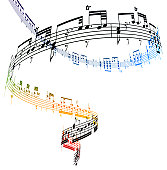
Home > Music Theory > Advanced Music Theory
|
||||
Advanced Music Theory
The more that you understand about your instrument, the more you will be able to understand how to get the best from your instrument. In this article, we will talk a bit about advanced music theory, and how it can help you to further yourself as a musician, not only for your career but for your own private playing as well. We will also help you to decide whether or not advanced music theory is right for you. So how do you know when you are ready for ”advanced” theory, and how do you make the distinction between intermediate and “advanced” level theory? This may shock you, but there isn’t much of a difference. Musical theory is like a mountain, and when you are working, you are continuously coming closer to the peak. That peak isn’t perfect knowledge, but it is full knowledge; the ability to understand most aspects of musical theory as pertains to bettering your musical knowledge both for playing and for mental application. Now, just like climbing a mountain, you are continuously advancing your position toward that peak. You are never truly in a “beginner” position, or an “advanced” position because you are constantly moving, working your way up to the top. With theory, this means you are constantly being exposed to new ideas, new lessons, and further teachings.
In fact, many “advanced” theory concepts have a lot to do with things you learn right when you take your first steps; further intervals, perfect octaves and triads, multi toned chords and equal temperaments of non-octave intervals—things that take your original lessons and pull them in new, exciting directions. The entire purpose of furthering your musical knowledge is to better yourself as a musician and open your mind to concepts and ideas that may not have been previously understood or brought to your attention. In the end, you’ll know if advanced theory is right for you. If you want to understand more of the technical aspect of music in order to help yourself craft better music, then it is perfect. If you tend to prefer knowing a little and being able to write from your heart or your creativity, using music as a sort of outlet, then advanced theory may not be best for you, as it pushes you further from writing with your feelings and more toward writing with your mind.
=> http://pianoplayerworld.com/HarmonizeAnyTunes.html
| ||||
|
Although every attempt has been made to make information as accurate as possible, we are not responsible for any errors that may appear.
 Furthering your knowledge in any field is a great thing.
Furthering your knowledge of your instrument is a superb thing. Not only can it help you to write better, more
cohesive music, but it can also help you to understand more about why idea A, B, or C didn’t work and what you
can do to make it work.
Furthering your knowledge in any field is a great thing.
Furthering your knowledge of your instrument is a superb thing. Not only can it help you to write better, more
cohesive music, but it can also help you to understand more about why idea A, B, or C didn’t work and what you
can do to make it work.
 It would be wonderful if you could simply gauge where you are on the
mountain, but while climbing it, you don’t ever really know exactly where you are, never truly have a pinpoint
location on yourself until you reach that top. Musical theory is the same way; you never know where you are
because as you move, now and then meld together.
It would be wonderful if you could simply gauge where you are on the
mountain, but while climbing it, you don’t ever really know exactly where you are, never truly have a pinpoint
location on yourself until you reach that top. Musical theory is the same way; you never know where you are
because as you move, now and then meld together.



